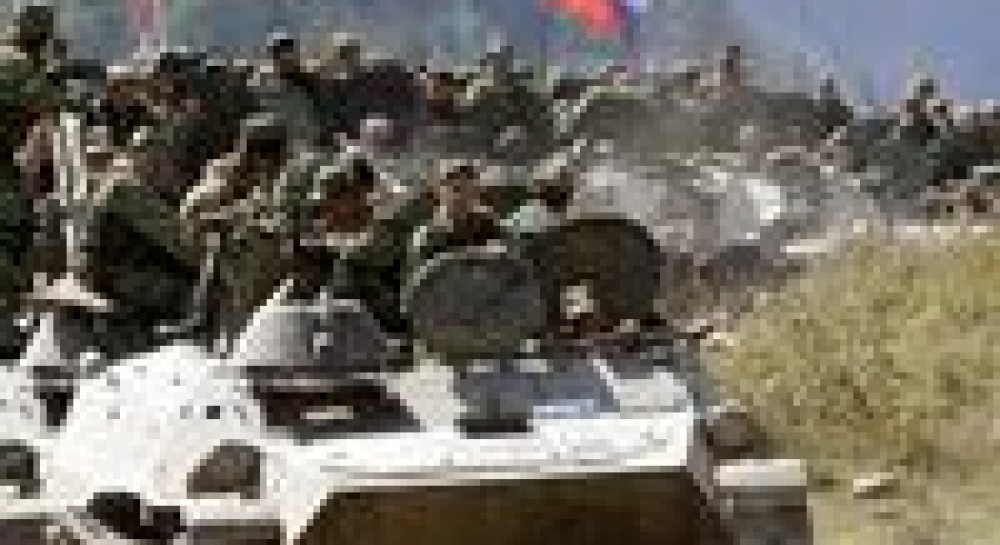
Russia's propaganda warfare
Western leaders face two fronts in their stand-off with Russia over its use of force to re-draw borders in Europe: one is the Russian army on the ground. The other is a propaganda war.
Western leaders face two fronts in their stand-off with Russia over its use of force to re-draw borders in Europe: one is the Russian army on the ground. The other is a propaganda war.
So far, the West has failed to spell out a common response, to get Russia to end its occupation of large parts of Georgia and undo its recognition of the independence of South Ossetia and Abkhazia.
Meanwhile, Russia has unleashed a propaganda barrage against an "aggressive" Nato alliance, drawing sharp ripostes from western leaders.
President Dmitry Medvedev, who came to office with overtures to the West, now warns of a "crushing response" to any other country that threatens the lives or dignity of Russian nationals. He is "not afraid of a new Cold War", he adds.
Inconsistencies
This war of words is not just a diversionary tactic.
The statements of Russian leaders reveal an underlying strategy which suggests that the West is right to see dangers ahead from the actions of a belligerent Russia.
But those same statements also show glaring inconsistencies which belie Russia`s apparently strong hand.
The Russians` strongest argument in defence of its armed intervention is that blame for the outbreak of a shooting war is shared.
Most observers agree it is, and that Georgia`s President Mikheil Saakashvili acted rashly or wrongly in ordering his army to bombard and take the South Ossetian capital Tskhinvali.
He was wrong, too, to speak of Russia "exterminating" his nation.
But in many other ways, Russia`s defence of its armed intervention has been found wanting or false.
Russia`s official charges of "genocide" by Georgian forces against the South Ossetians were quickly discredited by Human Rights Watch.
Broken promises
Moscow`s South Ossetian allies still claim that nearly 1,700 people died in the Georgian assault but evidence has yet to be produced.
Moscow`s repeated promises to withdraw its forces as prescribed in the French-brokered ceasefire plan have been broken in many parts of Georgia.
That is what prompted the European Union and Nato to accuse Moscow of breaking international law, and breaking its word.
Mr Medvedev argued that Russia had been forced to use force to protect its own nationals in South Ossetia.
But Russia has deliberately engineered that situation by handing out Russian passports to large numbers of local inhabitants.
Sweden`s normally soft-spoken Foreign Minister Carl Bildt retorted that Russia`s resort to that argument echoed that of Hitler in annexing pre-World War Two Czechoslovakia.
Finally, Russia`s claim that its motive in Georgia was purely humanitarian was exploded by this week`s decision to recognise the independence of the two breakaway regions.
This catalogue of feints and deceptions has hardened international opinion towards Russia to the point where the West is undertaking an overall review of ties with Moscow - something scarcely imaginable only a month ago.
The acute international alarm regarding Russia stems from the offensive part of its concerted campaign to send messages of varying degrees of threat to other countries.
Strategic target
Dmitry Medvedev`s hint that Russia might feel justified to intervene on behalf even of Russians living in other states brought a defiant show of solidarity from the leaders of Ukraine, Poland and the three Baltic states as well as Georgia.
A senior Russian commander explicitly threatened Poland - saying it made itself "100%" into a Russian strategic target - after the Poles signed an agreement with the US to station American troops and missile defence shield interceptors on its soil.
Russia`s Deputy Foreign Minister Grigory Karasin castigated the western media for what he called their consistently anti-Russian reporting of the Georgia conflict.
But in Europe`s free and diverse media Russia`s side of the story is regularly reported in detail, and views critical of the US over Iraq and Kosovo are commonplace.
In Russia, by contrast, the most influential medium of TV is heavily slanted to favour the Kremlin`s line.
Catastrophic
Russia`s plea for understanding is undermined by its various punitive actions over recent years against nearly all of its neighbours to its west, from cutting the flow of gas to Ukraine to alleged cyber-attacks against Estonia.
Russia does indeed have friends in the West who are inclined to take a lenient stance now - Italy`s Prime Minister Silvio Berlusconi for one, who once put himself forward as Vladimir Putin`s "defence lawyer".
But the real international fallout from Georgia is proving little short of catastrophic for Russia.
By its actions it has put at risk its privileged position within the G8, and earned the clear condemnation of Europe`s two major international institutions devoted to building democracy and peace - the Council of Europe and the Organisation for Security and Cooperation in Europe.
A way out for Russia lies in the precise pledge made by Mr Medvedev when he became president of Russia only three months ago - that he would strive to make Russia a nation that truly respects the rule of law and international norms.
Otherwise Russia could be undone by its own myths, and be isolated in the new Cold War that its leaders still say they do not seek.

